|
How odd it is to celebrate Earth Day so quietly. Usually there are local events where I see friends. In fact this year--pre-pandemic--I was organizing an event at The Gmeiner Art & Cultural Center here in Wellsboro where, along with other highlights (like Melina Moyers' wonderful nature oil paintings) I would read an excerpt from my book. But even though we can't do all the things we usually do on Earth Day, it's still worth thinking about how the homes we are quarantined in are part of one large home in which we all abide.
So if you're looking for a story to briefly take you out of your home and into the public lands of Idaho and Wyoming, here is approximately a ten minute excerpt from my book, When Everything Beyond the Walls Is Wild. It was in the low thirties, but the back porch seemed the right place to record it. I can hardly wait to hike with friends again. But mountain lions are roaming the roads in Colorado, and I'm sure Pennsylvania critters are enjoying this peace and quiet our quarantine has gifted them. Peace y'all.
2 Comments
PART TWO: (Read Part One here) 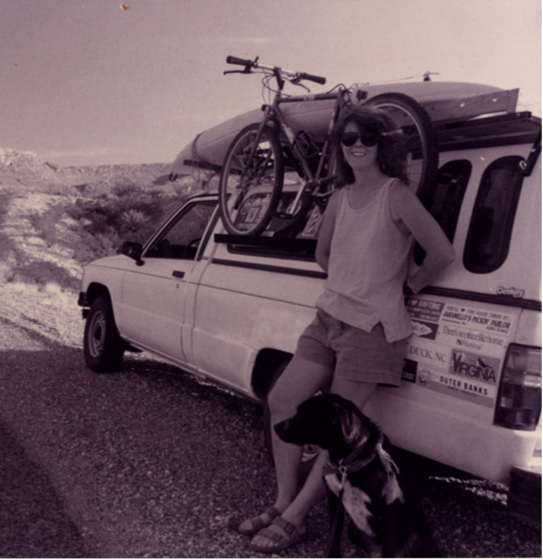 Nice rack, huh! Nice rack, huh! I headed west once again about a year later, this time for graduate school just south of Los Angeles. I had the same truck, same no-boyfriend, but had upgraded my dog and rack system. This rack was custom made and mounted a steel frame around the top of the cap, with a wooden platform on the back for tying down boxes. It didn’t get in the way of the 2x4 and pipe boat rack—which I could still pop on and off. On the driver’s side, a vice clamp stuck out from the steel frame and a gutter wide enough for mountain bike tires was attached to the fiberglass cap. When I moved cross-country, my rolled up futon wrapped in plastic, footlocker, kayak & paddle were tied on top, with my bike on the side (easily accessible) and everything else inside. I finally knew how some women felt when they got a new purse or diaper bag that carried everything they wanted with the just the right compartments and style. I headed to CA early because I thought finding a place to rent with a dog might be hard. Turns out another student in the English Department was losing her roommate and had a pet rental. I was set, except I couldn’t get in till August. It was a great excuse to visit a favorite cousin and her husband in northern California. They graciously let me descend on them for many weeks. During that time, her husband, Marc, invited me to join him on a vacation in the Columbia River Gorge where he was meeting several friends who were also doctors and now lived all over the country. They were going to wind surf, but I could camp, bike, hike, and kayak—since I already knew windsurfing was not my thing. This was how I found myself crossing the state line back into Oregon, my dog on the bench seat next to me, following Marc in his van. I’d left the futon behind and had the truck set up for camping, my bike and kayak on the rack. Just before we got to Hood River and the campground, Marc pulled into a gas station and hell followed with him. That is, I followed him. And, for a coach bus driver, I embodied a level of accidental chaos neither of us could have anticipated. The bus did not need gas, but the passengers, on tour of the Cascades or gorge, needed a real restroom and snacks so he’d pulled over by the left curb. The only pump available was parallel the bus, with enough room for me to pull in and a person to walk between. I was pulling as close to the pump as possible, watching my passenger side mirror, when I heard the screech of metal. The fact that I was going no more than 5 mph and hadn’t felt a jolt meant I was pretty surprised to see, when I stopped the pick up and looked out my window, the bus door hanging by the bottom hinge and resting against the side of my truck. I don’t believe one should use the word flabbergasted lightly, but that is the only way to describe the demeanor of the bus driver who was now standing on the step peering out. Apparently, just as I’d been pulling in, he opened the door, which took up the gap. The few inches my bike handlebar stuck out from the side of the truck was enough to catch the door’s edge. Those door hinges were no match for the vice clamp holding my Specialized Hardrock, though the bike frame had definitely been bent. There was nothing to do but call the cops who arrived quickly, but one can never be quick enough for a bus driver with people who have paid to go somewhere by a certain time and are suddenly detained. Marc came over, shook his head, and left to use the restroom. The cop walked up and took in the scene. I was 21 and looked more like a river rat than a responsible member of society, an impression my bestickered truck did nothing to quell. Shaking his head over the bike rack I prepared myself for the lecture, recalling the officer who’d given me a similar lecture over my previous bike rack. Would I never win? Definitely not that day, I realized, as the cop went to write down my license plate number and looked at the front of my truck rather than the back. “Uh, that’s not the right one,” I told him, remembering I still had the rare version of my former Oregon plate on the front because North Carolina only used a rear plate. It never occurred to me to remove my old one on front when I left NC. It was special, issued only July 1988 to November 1989. It had pale lavender mountains against a light khaki sky, with a pale green Douglas fir in the center. It was so distinctive that in 1988 it’d been awarded “Plate of the Year” for best new license plate by the Automobile License Plate Collector’s Association. This was a first for Oregon, but if you look at their previous plates it’s clear why they never came close before. 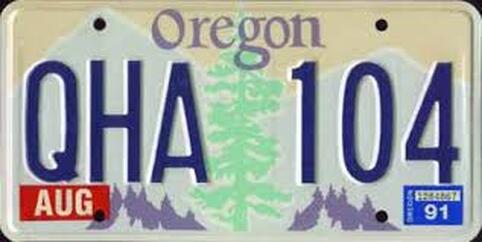 Now the lecturing began again as I showed him my insurance information. I didn’t really listen. I was trying to figure out what it was about his tone that had me feeling like he didn’t think this would’ve happened if I hadn’t been a female traveling alone. The person who made the rack, and the friend who’d had one and given me the idea, were both males. I wondered if they really wouldn’t have pulled into that pump. The guys I knew seemed to love maneuvering their much bigger trucks into much smaller spaces. Something I tried not to read too much into. Pictures were taken, and my dog watched good-naturedly from the open windows as strangers milled around her home-on-wheels. I don’t remember how long we stayed, but I know I left before the bus did as they waited on a new door. I was not given a ticket. Maybe writing it up was more than the officer could face. After all, if the bus driver had been paying more attention he might’ve waited till my vehicle stopped before opening the door. But I didn’t see that either of us was truly at fault. At the campground, I examined my bike. I wouldn’t be doing any riding this trip. I called the accident in to my insurance, but wouldn’t be able to complete my claim till back at Marc’s. I sat around the campfire, drinking beer generously provided by one of the doctors who had already decided my name was too difficult and he’d call me Lolita. The four men, about ten years older than me, told story after story of their adventures together and alone, laughing at all their mishaps and gloating over proud feats. Most of them sounded like things I’d love to do. Why, I wondered, was it so hard to feel like I could belong out here? Sometimes you do nothing wrong and there are things beyond your control that take over. I’m sure the folks who designed the award-winning Oregon plate felt that way when the colors were changed in response to public criticism. I’m pretty sure the bus driver knew the feeling too. PART ONE: Bike Racks were like boyfriends. Good ones made my life better, but bad ones got me into trouble. I didn’t care a bit about having one for the beginning of my life, but one day it was all I could think of. I was twenty-one and living in Ashland, Oregon. I’d finished college the May before, taken several meandering weeks to drive cross-country in my Toyota 2WD long-bed, then worked that summer as a nanny. After that gig was up, I wasn’t ready to head back east so got a job doing layout for the Medford Tribune. When I wasn’t working, I was hiking, canoeing, and mountain biking with new friends. Using some of my small earnings, I bought a Specialized Hardrock so I could go on the bike rides. It was the first bike ever to be only mine. My Freedom Machine. Growing up, I’d been passed down my brothers’ bikes, and then shared my mother’s. 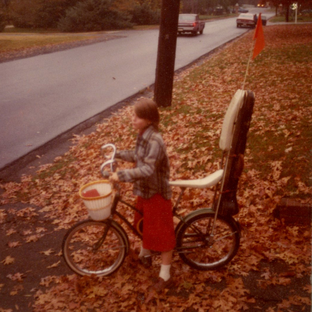 Dad added the basket to my brothers' bike. I added the trombone. Dad added the basket to my brothers' bike. I added the trombone. After three months, I heard of a job opening back in North Carolina. Now that I was satisfied I could “make it” where no one knew me, it seemed more important to be where I had a network of people I knew well and cared about. I got a job, quit a job, and started packing. But I didn’t have room inside the truck for the bike, not if I was going to sleep there. This was 1990, and I got a cheap one made for sedans or compacts that you latched the rubber-encased claws over the lip of the back window and stretched the nylon straps in some precise Jacob’s ladder string game I could never get right. I don’t remember where I got it, but the salesperson helped me make sure the straps would stretch over the long hood of my pick-up. Since I got in and out of the back of the truck cap many times a day (and night), I couldn’t mount it there.  With the handlebars on the passenger side and seat dropped down, the bike in no way impeded my vision. It was maybe my second night on the road, somewhere on I-80, my headlights shining through the spokes across long empty vistas, that I got pulled over. The old grizzled cop seemed a bit surprised, and then even more offended, that the driver of the bestickered gypsy mobile was a single female. Apparently my IADOREGON and HUG A MOOSE FOR JESUS stickers didn’t outweigh my anti-nuke and VOTE AGAINST HELMS. He pulled me over for not signaling when I got back in the right lane after passing a vehicle. I wasn’t speeding and was several tractor-trailer lengths ahead before I returned to the right lane. He spent a lot of time walking around the truck with his flashlight, peering into the back windows. “I’m gonna let you slide on not signaling, but you can’t drive with your bike on the front like that.” “Why not?” “ ‘s against the law.” “The man I bought it from said it was fine.” “Not in this state.” He’d already seen my OR license and plates. What could I do? I promised I’d change it after I found a place to stop for the night, knowing I wouldn’t. “You don’t sleep by the side of the road, do ya?” He’d leaned in to look me in the eye, struggling between suspicious and protective. “No Sir,” I answered 98% honestly. And that was that. He followed me for a while until I took an exit with campgrounds. Back in NC, I sold the rack cheap and put my bike inside the truck when I went riding. I knew I’d need a better system next time I traveled and camped cross-country. And I knew that would be sooner, not later. In the meantime, I bought a whitewater kayak. Don’t miss the next installment, when Oregon and bike rack #2 converge to this hero’s dismay. Add your email to subscribe. 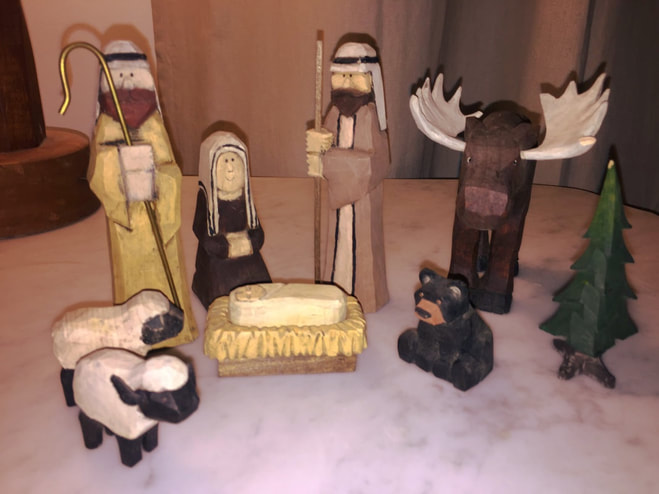 Wildly Domestic Nativity Wildly Domestic Nativity This time of year I tend to fall into binary thinking even more than usual. Was 2018 a good or bad year? Was I naughty or nice? Beer or wine? Looking at my favorite nativity scene I’m reminded that black-and-white distinctions are false and lead us into quagmires of absolutism that absolve us from thinking deeply about decisions and desires that we’d benefit from examining. Look at how the wild and domestic are combined here. It’s not just cute, it’s the truth. Not literally—though a literal interpretation of the nativity is never my aim. But this earth is a swirl of the wild and domestic, which interact far more than western civilization would lead us to believe. As a very little girl, I didn’t see those distinctions. My backyard was wild, dresses were made for me to do headstands in, and I didn’t need a shirt in summer any more than my brothers did. When I turned five I had to beg to go shirtless one last time. I stopped wearing dresses in puberty when it was clear I needed to choose the kind of female I’d be. I chose tomboy even though I would’ve liked wearing dresses sometimes if people didn’t look around to see whom I was trying to impress. Tomboy seemed the only choice if I wanted to have a life of adventure. After that first choice, others followed, all based on choosing the wild over the domestic. I’d hang out with uncles rather than aunts, Dad rather than Mom. I’d love trees, not flowers. Prioritize being strong and independent over being kind and attached to others. Luckily I grew up to discover the falseness of such dualisms. I paint my nails and go long periods without a shower. I rock climb and knit. I love cooking, decorating my house, and raising my children as much as I love solo backpacking, belching, and letting my children run free. I love being a wife because my husband has no illusions that I am domestic, or that I am always wild. My hope for everyone in 2019 is that the binaries begin to fall away even more. That any resolutions we might make will lead us closer to our authentic selves, and more open to seeing people in their authentic otherness. Happy Binary-free New Year! LilaceThis weekend I took my daughter and a friend of ours to the NY Fairie Festival. I'd seen an ad pop up on Facebook (why yes, FB, I am interested in that too), and followed a hunch. My husband and I do not overbook our kids. We will not schedule their days full, partly for selfish reasons, but they seem to appreciate that and love unstructured play time. I do like to throw in some big fun once in a while that will create, I hope, childhood memories that never fade. So we donned whatever fairy stuff we could put together (for me it was the ribbon and flower garland from my wedding--it was a magic day after all) and drove more than 2 hours one way. It was so worth it. The day was warm and sunny, but there was lots of shade. Everything was tucked into forests and fields, creeks and hills, and in many cases you couldn't tell the visitors from the actors. Adults and kids and pets all dressed up. Everyone talked to each other—there were no strangers but you needed to watch for the trolls. They have no manners and muddy hands. There was a reasonable entry fee and the performances were for tips and the activities were free. There were many artisan vendors with leather masks and horns, and colorful garb, and face painting and, and, and.... There was too much to take in our first time. 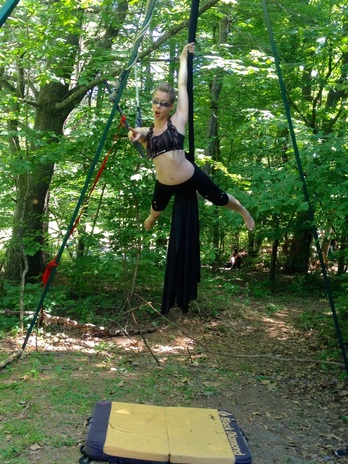 This was a wonderful use of outdoor spaces. On one hand the world it created wasn't real, but in another way it made me more aware of the magic in the world we have. Here were people of all sizes and shapes in beautiful fabrics and fashions dancing unselfconsciously. All ages and genders were playing pretend, laughing and singing together. Many were barefoot. Hammocks hung everywhere (the Lost Boys enclave in Neverland matched my childhood dream), people juggled, did tricks, and danced from ribbon ropes hanging from trees. The people were real, the play was real, and the magic such outdoor play created was real. I chose antler-type horns crafted from leather to add an animal aspect to my outer appearance, and later my daughter wanted similar, smaller ones. We didn't take them off when we got home, carrying the magic with us as we walked through our small town to join Jimmy and Gabe at the Wellsboro House for dinner. We were our own species, and I revelled in the connection shared play had given us. I'm not much for playing dolls, as my daughter will tell you. But this--this I can do. These last few days after Christmas, I have been staying in my pajamas, reading, cooking big meals I don't usually have time for, and listening to my daughter and son giggle, squeal, and laugh from various rooms in the house. They are old enough now that I don't need to check on them. Occasionally they start bickering so I command them to play separately. Soon I hear the squealing and laughing again. I love this age. They're also at the age (almost 8 and newly 11) when they take in more of the swirl of messages around them--from the news, friends, adults who think they aren't listening or won't understand. My son is reading YA (carefully monitored). By our own preference we don't watch news or TV at all, just movies. But because my husband and I are environmentalists and our writing, teaching, and research are in this area, our kids see magazines and Facebook posts mentioning all the crises that need our immediate response. I don't know about you, but the sex talk is not what strikes terror into my heart. It's the climate change talk. And like the sex, our approach to climate change is linked to faith and wonder and love. Like sex, our approach to climate change balances on what type of relationship we have with the more-than-human world. This Christmas was warm, really warm, and reminded me of one when my son was an only child and I wrote a poem that recently appeared in Paterson Literary Review Issue 42 (see below). This Christmas we played outside with Nerf guns instead of sleds, threw the frisbee for the dog, and went hiking with friends. Who knows how many white Christmases the future holds for Northern Pennsylvania--more or less. Regardless, nature is a magical world that I want my children to know and love. For their sakes, I will do all I can so wonder will provide a counterbalance to the worry that will ultimately be part of their relationship with the earth. Evergreen
and the poets are at their windows because it is their job for which they are paid nothing every Friday afternoon. —from “Monday” by Billy Collins The day after Christmas, 2006, and nowhere in the lower forty-eight is below thirty degrees Fahrenheit except, my husband reports, a spot in Maine. I can be upbeat. Children in northern climes with new bikes are out riding them, spinning circles in circles. But how can I ignore those tykes who stand on porches holding sleds, their hats in their hands. Really, it is not today that worries me, an unremarkable gray without threat or promise, same birds at the feeder. Neither does tomorrow (a word my son only knows means “not now”) but some vague future. How will any child believe in a jolly giver-of-gifts wearing a fur coat by a fire at the icy top of the world once the glaciers are puddles in our textbooks? Regardless, the poets will be at their windows finding new images—maybe something a pretty shade of green to compare the sky to, pretty if we can just divorce memory from emotion and approach the new dawn, whatever its color, with the heart of a child on Christmas Eve who, looking back, knows he could have let go of the cat’s tail sooner, feels bad that she busted her brother’s favorite train, yet hopes a larger forgiveness presides. Yes, we poets will always be at our windows, except when at our children’s bedsides singing, shushing, singing. 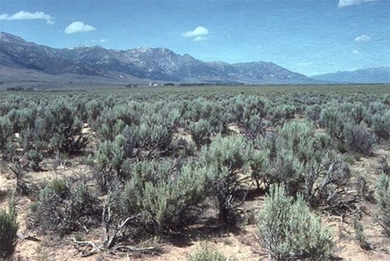 Don't give me a home where the buffalo roamed . . . Don't give me a home where the buffalo roamed . . . Some scholars call it a "sense of place," this feeling one has of connection to a specific landscape, usually positive. As an avid road-tripper and adventurer in my twenties, I drove all over the U.S. Sometimes I stayed for months in one area, and sometimes only a few hours. I can honestly say that I at some point I have been nostalgic for every place I've ever lived, except maybe the suburbs I grew up in. A mentor and friend I knew in Western North Carolina posed a question one day while we were having a beer and saying goodbye. Soon I'd marry my soul mate, a Carolina boy, and move with him out west for graduate school. My friend had just reunited with an old friend, whom she'd known when they were both married. Now both were single. Problem was, he lived in the Piedmont. The flatlands of mid-North Carolina. And my friend was a beach or mountains kind of gal. "Where do you stand on true love versus true geography?" she asked. I wish I remembered my answer. I think of this now because my ten year old son seems to have a sense of place already. It's certainly not an affinity for where he was born--Reno. When he was two and a half we drove back from Pennsylvania for a reunion. Gabe hated the sun's intensity and the winds that kicked up the sage late every afternoon. Not a desert boy. I had thought, like my husband, that where we ended up in rural North Central PA was a lot like the Southern Appalachians where we met, where we went to college, where his family has been for generations. (My mom was from Knoxville, TN, but Jimmy won't allow that I'm Southern since I grew up in Maryland.) I know that the mountains aren't as high (we're on the Allegheny Plateau here) but I also know that I have a lot of memories stored in the mountains down south. And I have always assumed memories made up 90% of my sense of place. The other day I mentioned to Gabe that we'd be going for a hike that afternoon. It'd been a while since we'd hit the trails and I wanted to enjoy the warm fall day that glowed with the last leaves. "Ugh. Do we have to?" "What's that supposed to mean? You hiked all summer without complaining." "But that was in North Carolina." "Yeah, where the hikes were longer, steeper, and hotter. You hate the heat." Turns out, none of that mattered. The type of rocks and forests and creeks were more fun and the views more beautiful. They called to him, called him from the creek and pastures of our Aunt's house where we stay, in a way the hills and creeks here in PA don't call him to leave his backyard. It's puzzling because he loves playing with buddies in the woods here. It's not like he has more time or space to play outdoors in NC. It's not like he has friends there he misses when he's here. There's family, of course, but they visit us too. But those Southern Appalachian rocks and forests and creeks are family too, I guess. And they can't visit. 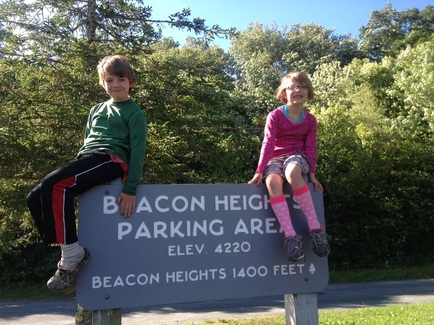 Can you tell our family likes pork? Can you tell our family likes pork? We visit family in Western North Carolina for several weeks, so I found myself thinking of how best to celebrate July 4 with the kids, while Jimmy was smoking pork all day for the evening BBQ. Not that everything has to be a lesson, but I'm sensitive to holidays losing their meaning. So, what do I want Independence Day to mean to my children? What do I love most about my country? The answer is easy: what I love most is the country, the land. And our legacy of wildly stunning public lands are the envy of many other nations. So we piled in the car to get some exercise and some perspective. On the winding drive I explained what a National Park was, and how the Blue Ridge Parkway belonged to every American--even them. Then we started hiking. We live at about 1300 feet elevation.We began our ascent at 2820 and topped out at 4220. We got perspective, alright. Even though they'd been to these mountains previous summers, the kids reacted in awe. They stopped and stared. Then they ran around, staying well back from the edge. There were big rocks to peer under and all sorts of things to discover first. Of course it only felt like they were the first to discover them. Unlike Columbus, though, they didn't try and stake a claim.
Right then it occurred to me that freedom often comes because we agree to share. To share land, roads (and their care). Basic services that I might need more one year and you might need more the next year, but that we each pay into every year, like the National Guard and other military branches. This freedom to experience the natural world is worth fighting for, if you ask me, and is why I'm such a huge advocate for our public lands. There are always politicians out there trying to convince us we're better off selling our National Parks, Forests, Monuments, Wilderness Areas, etc., so they can be run privately. That strikes me as unpatriotic. Certainly it's undemocratic, putting our natural national treasures into private hands. And it's not sharing. So as my kids explored freely, I vowed to take them outside more to places patriots have worked hard to protect and make accessible. To see the beauty of this land and to get to know their country. And I vowed to share more. Except when it comes to bacon. Recently I had a fun weekend, camping at a friend's remote place in NY--pottery studio, pond with water lilies and Koi, free range dogs and chickens, canoe, strawberry wine, s'mores. . . You get the picture. I brought my kids, and my bestie brought her adult son to meet her new sweetie who's a potter (it was his place). The kids and I hadn't seen her son, Jamie, since Christmas, so we were all excited. After I set up camp, my son wandered over. Gloria was still making stuff with clay and the others, but Gabe was ready to canoe. We don't get a lot of time just the two of us, and being on the pond with him, showing him how to hold the paddle, maneuvering around (and through) the water lilies, and seeing how fast we could go was wonderful. I like that he learns some of this stuff from his mother. That he will not grow up thinking women hate the outdoors or can't handle themselves there or are no fun to be with outdoors.
But I realized I take our outdoor activities for granted. My friend's son, Jamie, lives with a serious, painful back injury that's classified as a disability. He does not complain, but it affects every moment. He wanted to take the canoe out, and my daughter wanted to go with him. It's a small pond, she's a strong swimmer. What's the worst that can happen? They get wet--so what? Ok, the worst that could happen is the attempt is so frustrating it crushes his spirit and makes him feel like he can't do anything. This is called perceived risk, where the risk is emotional or social, and as an outdoor instructor I consider this as important as physical risk. But I believe in experiential education and this was his idea, so we encouraged them to go. He did not ask for help, so his mother and I offered none. We watched from the house as they pulled the canoe to the edge (there was no beach or landing), my daughter got in at the front, and with a lot of shoving and scooching they got the canoe in without getting wet. Then they snaked around the pond, Jamie doing all of the paddling. When done, they even climbed out onto the high bank without tipping over. We whooped from the house where we raised our wine glasses to his success, as Jamie pulled the canoe onto the grass. That night he kept talking about the experience. That half hour empowered him, brought him back to the person he'd been who loved camping. He felt like he regained some of his independence and couldn't wait to report to his aide and doctors. There are so many benefits to outdoor recreation, and most have nothing to do with how "extreme" the activity is. It's us existing in the world without electronics or motors. And to me, remembering that I am an animal is the biggest benefit of all. Here's to you, Jamie. You're such an animal. I never thought I'd write a novel. Long ago I got an MFA in poetry, and soon after branched out to write creative nonfiction as well. Art crafted around moments as real and solid as stone. Plot intimidated me. Then about four years ago, I started writing a picture book. But no, it wouldn't stop. It had more to do, to say. What was this thing? I did some research and discovered the world of middle grade fiction, the novels with main characters around 12 years of age that are more complex in language and plot than early chapter books, but more about belonging and less about sexuality than young adult novels. Strangely enough, the plot of my adventure fantasy came pretty easy in general. But there are many levels to plot, and pacing and tension are perhaps the most important in kidlit because of the audience's attention span. Lucky for me I enjoy revising. 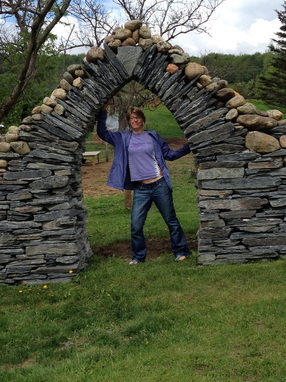 Me with one of Thea Alvin's arches. Me with one of Thea Alvin's arches. Last month I took a roadtrip to Vermont to spend time with a writer friend, and we visited Rock Scissors Paper gallery and workshop. Thea Alvin's mortar-less stone arches spoke to me. Actually, they shouted. I live in a world of metaphors, and here I was surrounded by the narrative arc in all its variety, improbability, and beauty. Thea Alvin builds wooden frames for her projects and places the rocks, gaging the pressure they exert on each other, using gravity to her advantage to lock the parts together. When she's done, she gives the structure a shake. If it's solid, she takes down the wooden frame. If not, she revises. There is no use trying to prop up a stone arch or a narrative arc. They must stand on their own. For my purposes, the rocks are inciting incident, rising action, turning point, falling action, rock bottom, climax, and denouement. The readers provide the gravity. It's up to me to get the tension right so nothing comes crashing down. |
LilaceI write, read, recreate, and raise kids in rural Pennsylvania. I teach part-time in Outdoor Recreation Leadership, Creative Writing, and Women's Studies at Mansfield University. Archives
April 2020
Categories
All
|
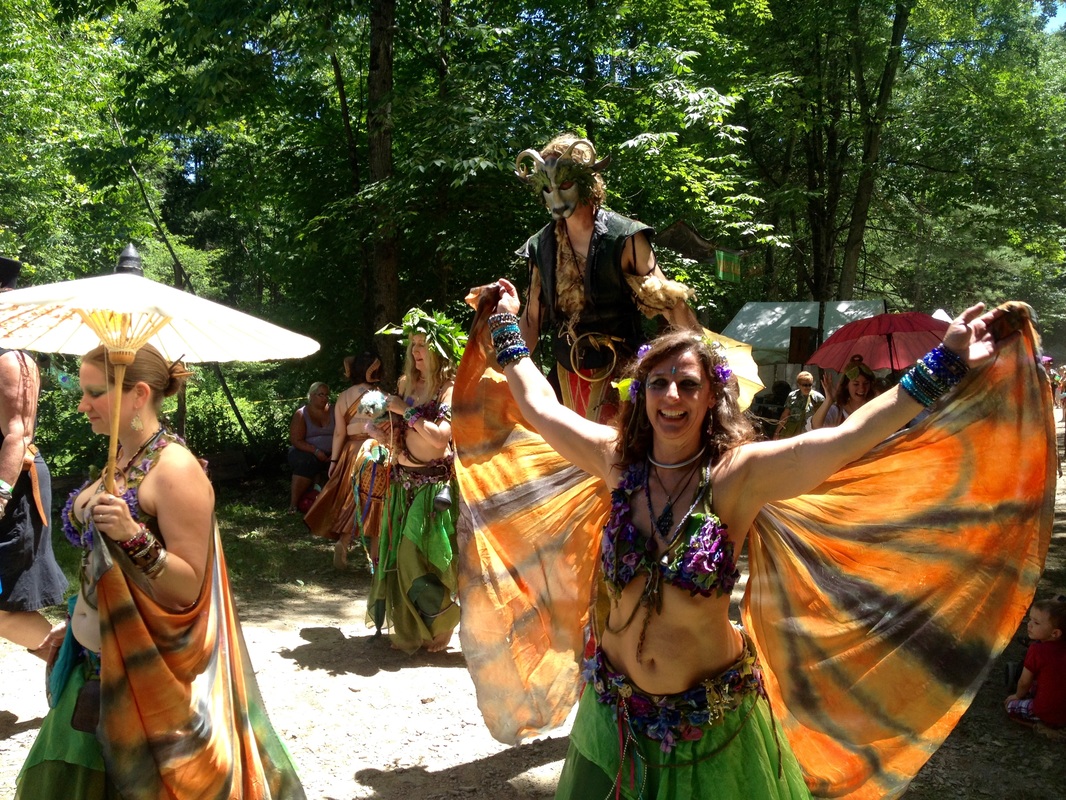
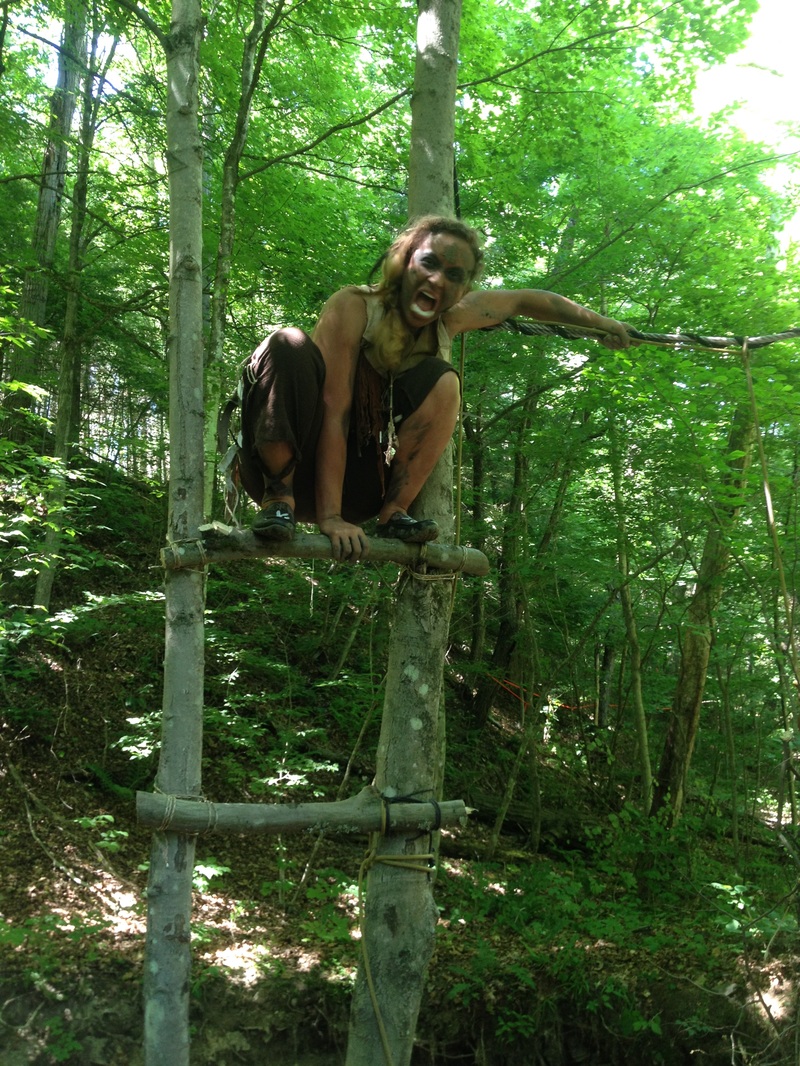
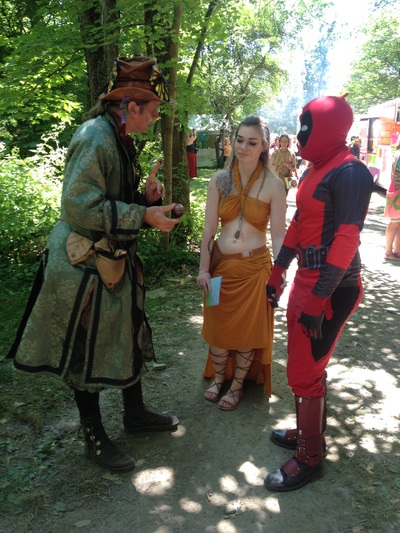
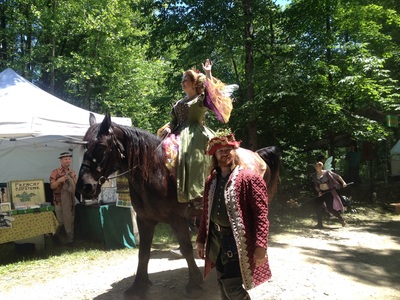
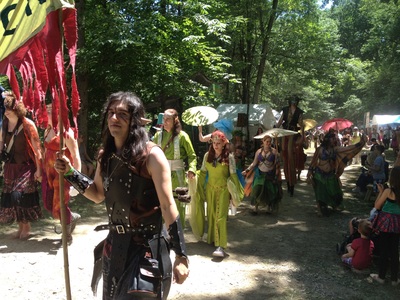
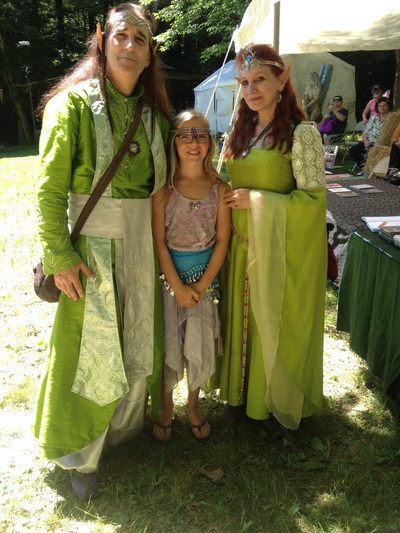
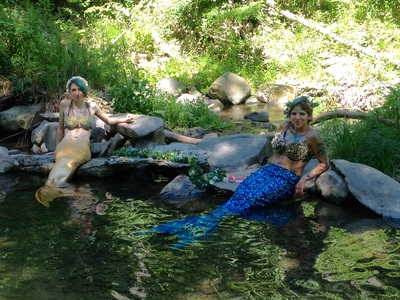
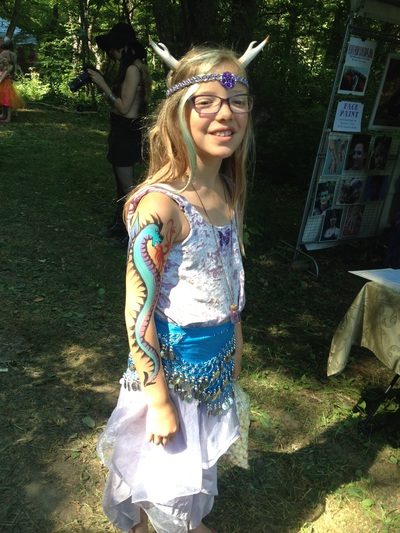
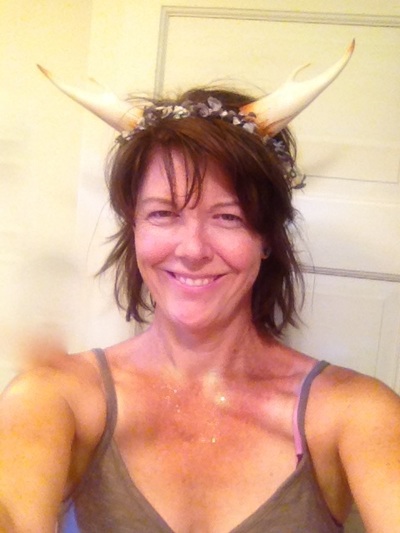
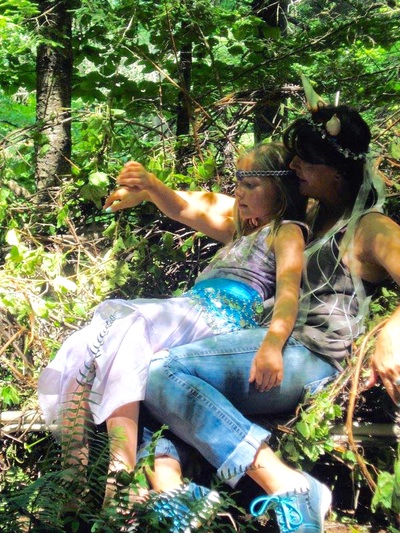
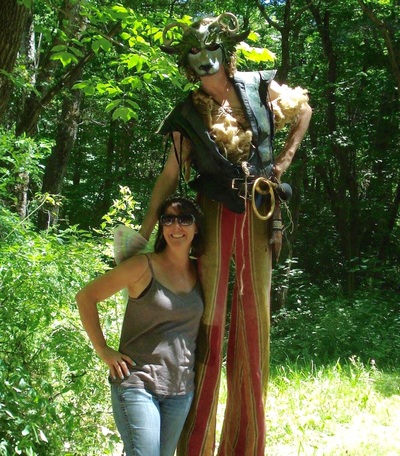
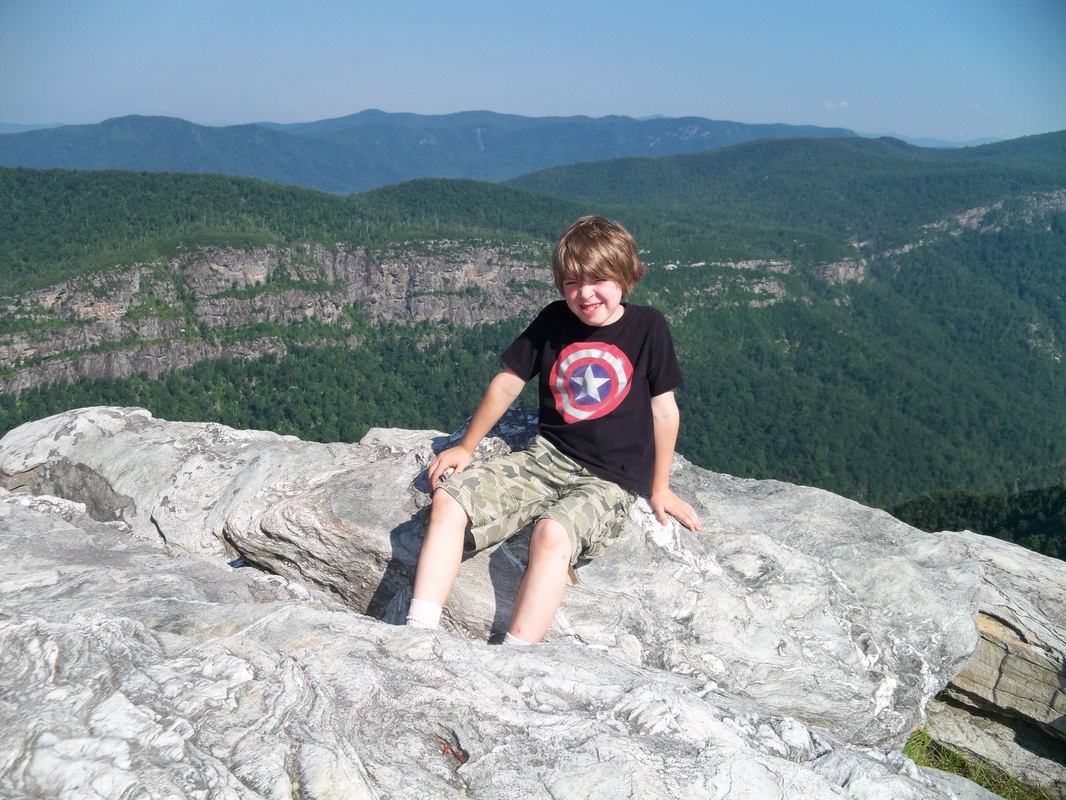
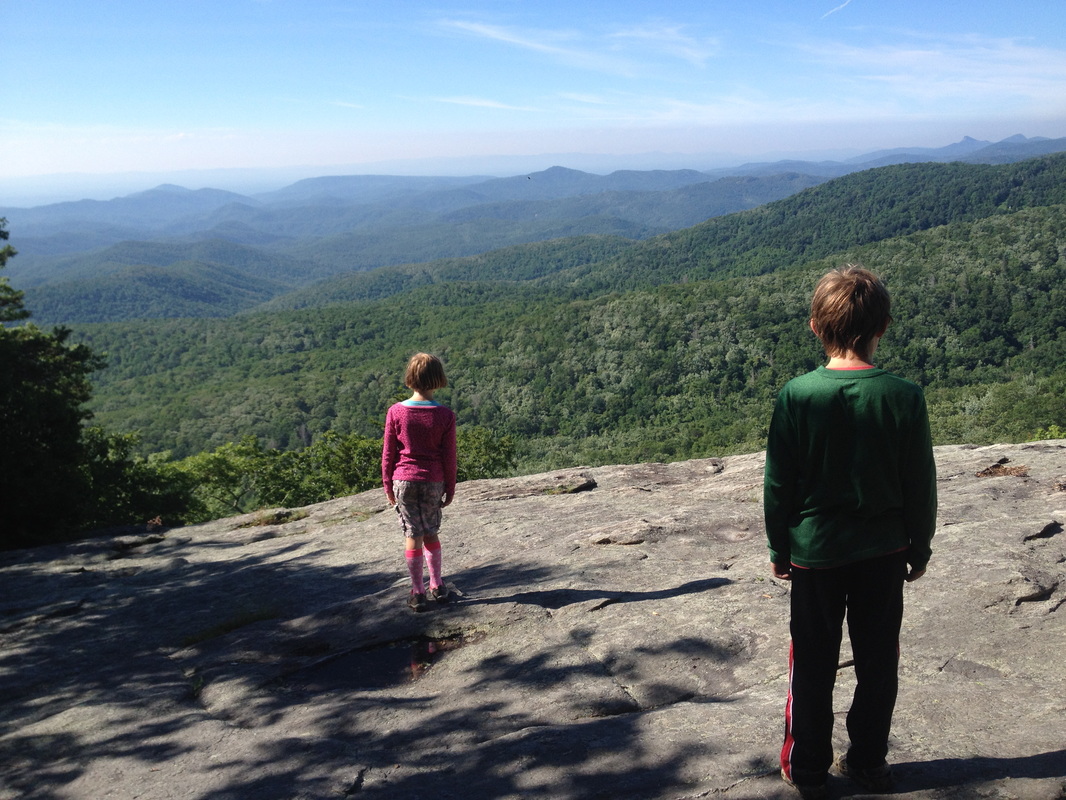
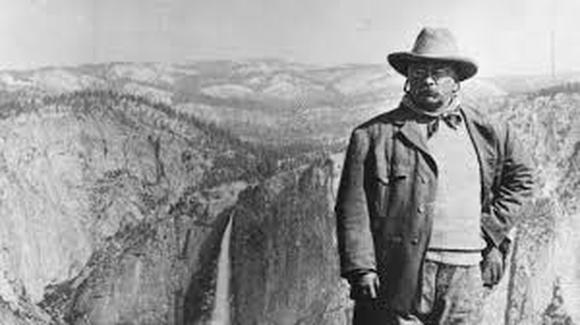
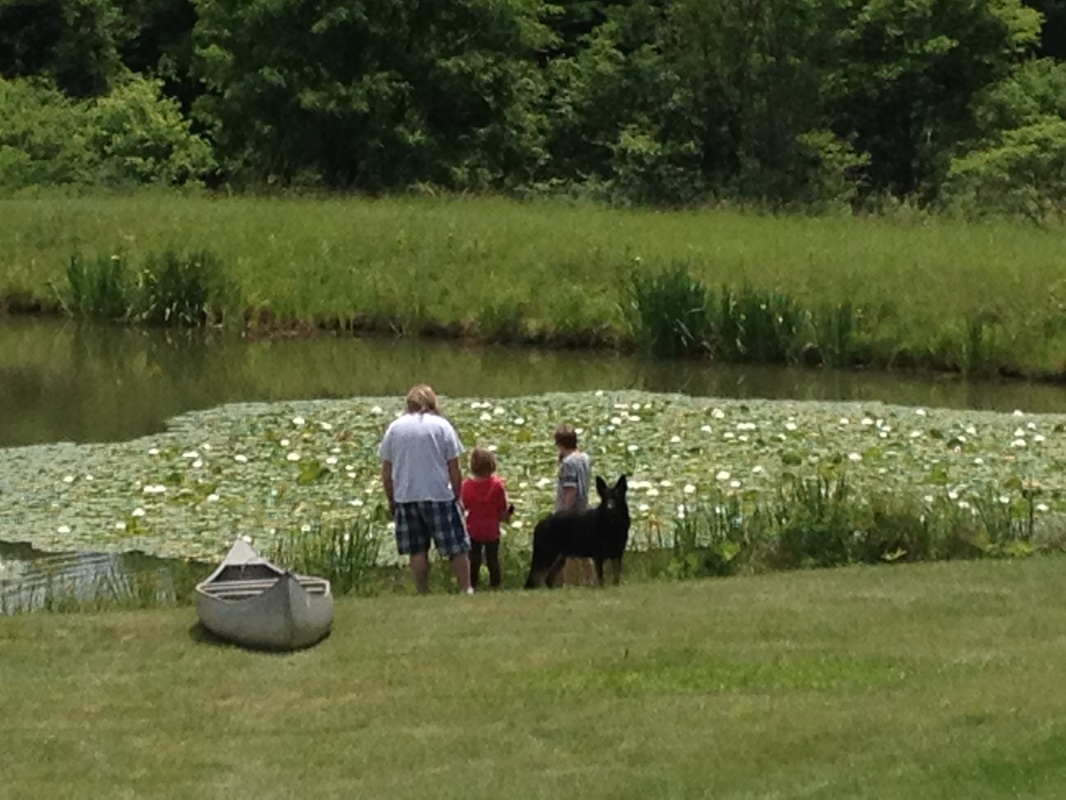
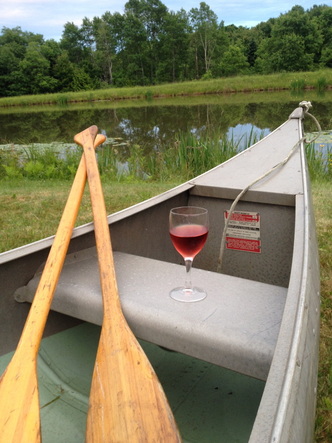
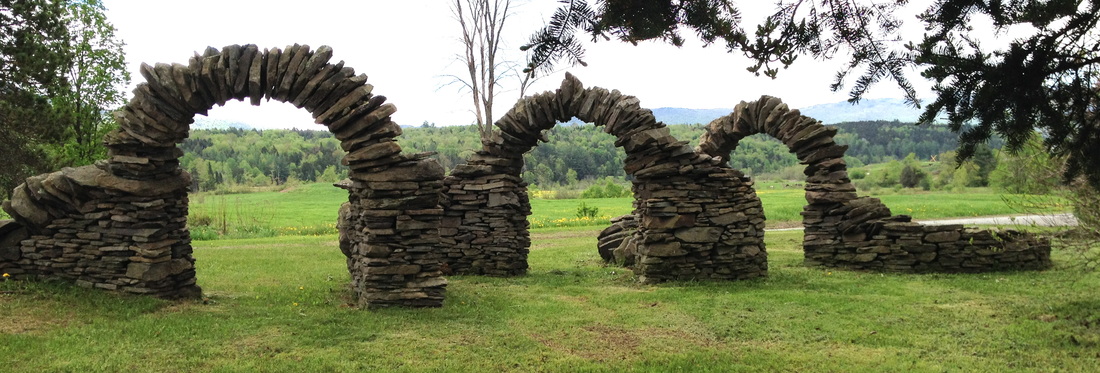
 RSS Feed
RSS Feed
